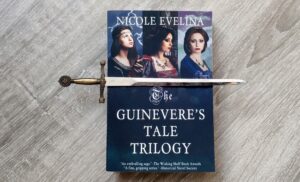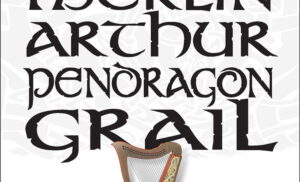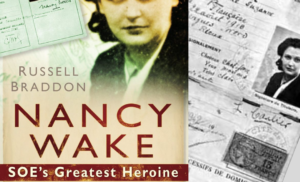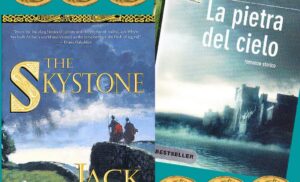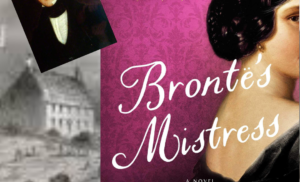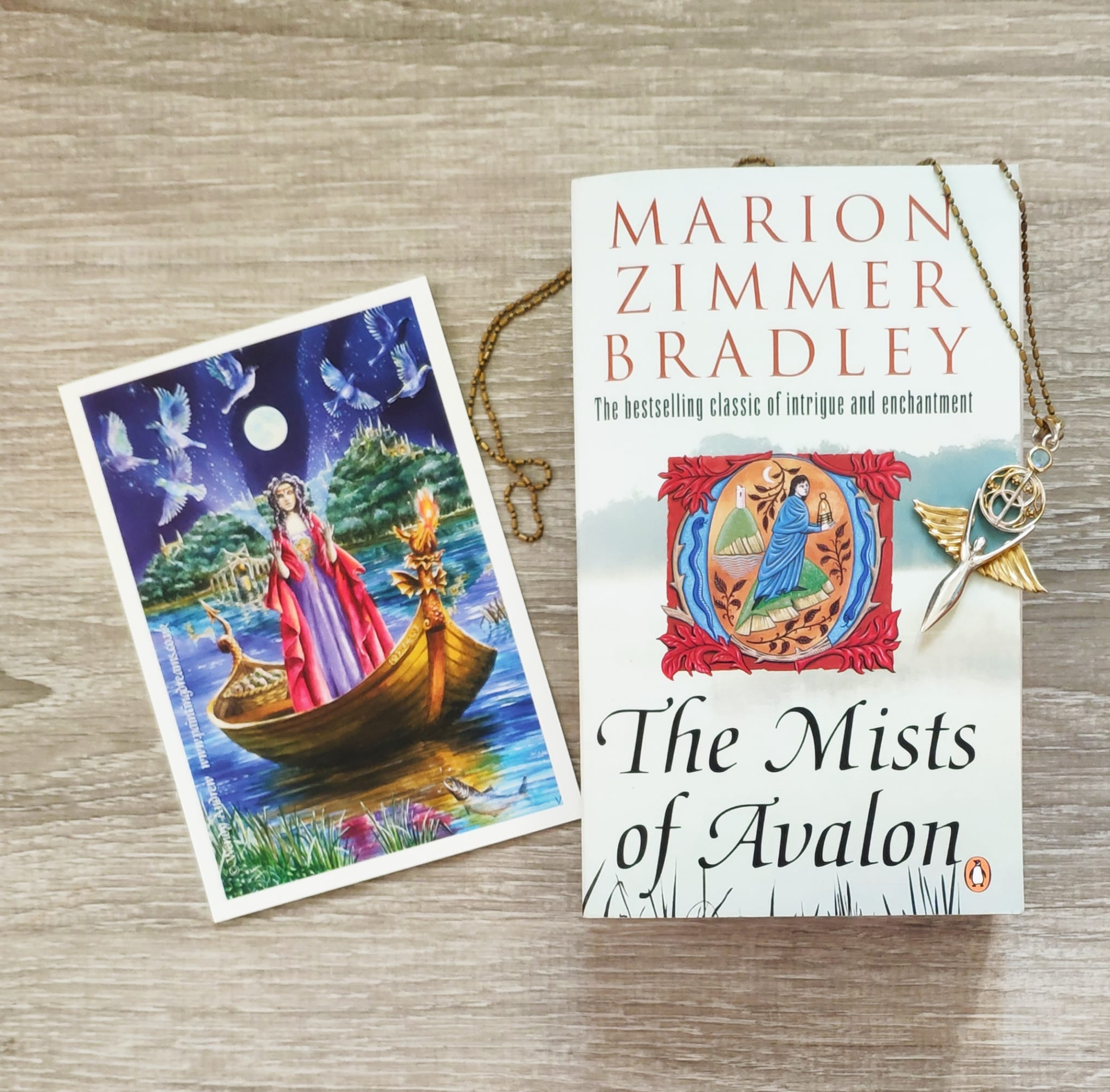
The Mists of Avalon * Le Nebbie di Avalon
Morgaine speaks…
In my time I have been called many things: sister, lover, priestess, wise-woman, queen. Now in truth I have come to be wise-woman, and a time may come when these things may need to be known. But in sober truth, I think it is the Christians who will tell the last tale. For ever the world of Fairy drifts further from the world in which the Christ holds sway.
I have no quarrel with the Christ, only with his priests, who call the Great Goddess a demon and deny that she ever held power in this world. At best, they say that her power was of Satan. Or else they clothe her in the blue robe of the Lady of Nazareth-who indeed had power in her way, too-and say that she was ever virgin. But what can a virgin know of the sorrows and travail of mankind?
Reading The Mists of Avalon is time consuming – a thousand pages, an archaic and fascinating language and a complex plot – but when you’re done you feel nostalgic, because the story and details pull you in so that you almost feel like dreaming it and being a participating character. Usually, it’s categorised as a fantasy novel, yet it’s quite a spiritual and historical novel. The author spent a lot of time researching, and if we read with our hearts rather than just our minds – especially the spiritual sections – we can clearly feel how Marion Zimmer Bradley had some deep intuitions, as if she really had a chance to take a journey into the past.
The book – a retelling of the Arthurian legend from the women’s perspectives – was made into an enjoyable miniseries in 2001, although too many things have been changed or cut, thus diminishing the depth of the story.
The main character is Morgaine, stepsister of King Arthur and Avalon priestess, destined to succeed Viviane as Lady of the Lake. Through Morgaine we experience the final transition from the matriarchal age to the patriarchal one, from a religion of the Goddess to the Christian one. Yet, as Viviane and the Druids say, “For all the Gods are one God […] and all the Goddesses are one Goddess, and there is only one Initiator. And to every man his own truth, and the God within.”
Viviane’s also mother of Lancelot, who wins the hearts of all women, including Gwenhwyfar, King Arthur’s spouse.
In this book, Morgaine’s portrayed quite differently than in most books and screen productions. She’s a wise woman, not particularly beautiful but very charming and intelligent. She’s a priestess devoted to the Goddess, but at first, she’s a young woman who feels betrayed and who must make a sacrifice too great for her to understand. She’ll realise soon enough that some of her choices contributed to the end of Avalon and will try to make amends, but it will be too late.
Viviane is the Lady of Avalon, revered by those who worship the Goddess and respected by the others. The same goes for Taliesin, that is the Merlin, a great man of wisdom and purity. Viviane loves Morgaine as a daughter but will be abandoned and reproached by the girl after finding out the implications of her sacrifice in the name of the Goddess. In the miniseries, Vivian’s murdered by Morgause but in the book things go differently and Viviane’s death’s even more symbolic about the end of an age and a religion (I won’t say anymore not to spoil it for those who haven’t read the book yet).
Igraine, an extremely sensitive and beautiful woman and mother of Morgaine and Arthur, is a pivotal character at the beginning of the book – she was raised in Avalon and was destined to give birth to the Once and Future King – but she slowly fades into the shadows. All characters have their own part to play in the great scheme of things, and once they fulfilled their job, it’s up to the next generation.
Igraine’s younger sister, Morgause, wishes she was raised in Avalon too but she’s not allowed for she’s purely interested in self gain. She’s particularly keen to darkness, so she’s not worthy of serving the Goddess. However, Morgause’s one of the most authentic characters of all as she doesn’t pretend to be differently, she doesn’t know hypocrisy.
Among all the female characters, probably the less pleasant is Gwenhwyfar. A naïve, God fearing, and ignorant young girl at first, she remains close-minded and spiritually immature as a grown woman. Behind her (apparent) prudishness and bigotry lay a deep-rooted ignorance, – despite being surrounded by a good number of wise people, rather than using the opportunity to learn a lot she complains and reacts aggressively, parroting back the dogmas inculcated by the priests who accuse women of being the source of all evil – a great deal of hypocrisy, and an ability of manipulating the men who love her and that will contribute to Arthur’s betrayal of Avalon. Indeed, when Arthur is with Gwenhwyfar it’s like he’s being bewitched, he gives up to all her requests and he’s quite different from the firm and determined High King loved by his subjects and respected by his enemies. This is one of the (rare) weaknesses of the book, whose focus on the celebration of the feminine and women often belittles the male characters, exceptions aside – Taliesin-Merlin is perhaps the only man equally loved and appreciated by all “parties”.
Then, there are Raven, Niniane e Nimue, priestesses of Avalon, each with a crucial role in the scheme of things; there’s Elaine, Gwenhwyfar’s cousing and Lancelot’s wife, and other characters more or less relevant. Each of them, in some way and to varying degrees, symbolizes meaning, i.e. Kevin, Taliesin’s successor as the Merlin, whose unpleasant physical appearance – caused by an accident in youth – also represents the corruption and betrayal of the Goddess and Avalon.
One could write an encyclopaedia about this novel and its meanings and symbols, that all readers can find and process according to their heart, but it’s surely a book that will go down in history, and will remain in the hearts of those who love the Arthurian legend.
And then a memory from Avalon surfaced in her mind, something she had not thought of for a decade; one of the Druids, giving instruction in the secret wisdom to the young priestesses, had said, If you would have the message of the Gods to direct your life, look for that which repeats, again
and again; for this is the message given you by the Gods, the karmic lesson you must learn for this incarnation. It comes again and again until you have made it part of your soul and your enduring spirit.
For audiobook lovers, I recommend the one read by Davina Porter.
♥♥♥♥♥♥♥♥♥♥♥♥♥♥♥♥♥♥♥♥♥♥♥♥♥♥♥♥♥♥♥♥♥♥♥♥♥♥♥
NOTA: L’articolo si riferisce al libro in lingua originale, The Mists of Avalon, Penguin Books 1993, e alla versione audiolibro letto da Davina Porter, Recorded Books, 2011.
Parla Morgana… Ai miei tempi sono stata chiamata in molti modi: sorella, amante, sacerdotessa, maga, regina. Ora, in verità, sono una maga e forse verrà un giorno in cui queste cose dovranno essere conosciute. Ma credo che saranno i cristiani a narrare l’ultima storia. Il mondo della Magia si allontana sempre di più dal mondo dove regna il Cristo. Non ho nulla contro di lui, ma solo contro i suoi preti che negano il potere della Grande Dea oppure l’avvolgono nella veste azzurra della Signora di Nazareth e affermano che era vergine. Ma che cosa può sapere una vergine delle sofferenze dell’umanità?
Le nebbie di Avalon è uno di quei libri che richiede tempo al lettore (un migliaio di pagine, un linguaggio arcaico e affascinante e una trama complessa) ma che, quando si è giunti alla fine, lascia un senso di nostalgia, quasi di perdita, poiché i dettagli e la sapienza narrativa trascinano dentro la storia cosicché si finisce col viverla come un sogno in cui anche il nostro personaggio è parte attiva.
In genere viene definito come un romanzo fantasy, ma in realtà è in buona parte un romanzo storico e spirituale. L’autrice ha speso moltissimo tempo a fare ricerche e in diversi punti, specialmente quelli più spirituali, se si legge con il cuore anziché solo con la mente si può percepire chiaramente che Marion Zimmer Bradley ha avuto delle profonde intuizioni, come se avesse davvero potuto guardare personalmente nel passato.
Il libro – che racconta la leggenda arturiana dal punto di vista delle donne che circondarono il più famoso Re del mondo – fu trasposto per la televisione nel 2001 e, sebbene sia nata una produzione gradevole, troppe cose sono state modificate o rimosse, sminuendone così la profondità.
La protagonista principale è Morgana, la sacerdotessa di Avalon sorellastra di Artù e destinata a succedere Viviane, Signora di Avalon e Dama del Lago. Attraverso di lei viviamo il passaggio finale dall’era matriarcale a quella patriarcale, da una religione fondata sulla Dea Madre a quella cristiana. Ma, come insegnano i Druidi e la stessa Viviane: «Tutti gli Dei sono un solo Dio […] e tutte le Dee sono una sola Dea. C’è un solo Iniziatore. E ogni uomo ha la sua verità, e in essa c’è Dio.»
Viviane è anche la madre del nobile e famoso cavaliere Lancillotto, che conquista i cuori di tutte le donne e di Ginevra, la sposa di Artù, Grande Re e amico di Lancillotto.
Morgana in quest’opera è totalmente diversa da come viene solitamente raffigurata in altri libri e film arturiani. È una donna saggia e profonda, di bellezza mediocre ma di grande fascino e cultura. È una sacerdotessa devota alla Dea, ma anche, al principio, una giovane donna che si sente tradita, cui viene chiesto un sacrificio che non è ancora pronta a comprendere. Si renderà conto troppo tardi che alcune sue scelte hanno contribuito alla fine di Avalon e cercherà di rimediare, ma sarà troppo tardi.
Viviane è la Signora dell’Isola di Avalon ed è venerata da chi è devoto alla Dea e, dagli altri, è molto rispettata, come lo è Taliesin, ovvero Merlino, grande saggio di rara purezza e profondità. Viviane amerà Morgana come una figlia ma verrà da lei disprezzata e abbandonata dopo il grande sacrificio cui la giovane verrà sottoposta nel nome della Dea e di Avalon. Nel film, Viviane viene uccisa da Morgause, ma nel libro le cose vanno in modo diverso e la morte di Viviane è ancora più simbolica della fine di un’era e di una religione (non aggiungo altro per guastare la sorpresa a chi non lo avesse ancora letto).
Igraine, donna di grande bellezza e sensibilità nonché madre di Morgana e Artù, è un personaggio fondamentale all’inizio del libro (formatasi ad Avalon, il suo destino è dare alla luce il più grande Re di tutti i tempi), ma che gradualmente perde rilevanza. Ogni personaggio infatti ha un suo ruolo nel piano divino, e una volta compiuto il proprio compito, tocca alla generazione successiva.
La sorella minore di Igraine, Morgause, avrebbe voluto formarsi ad Avalon ma non le viene permesso in quanto è puramente interessata al potere e al guadagno personale e particolarmente incline all’oscurità, all’Ombra, e non degna quindi di servire la Dea. Tuttavia, Morgause è uno dei personaggi più autentici dell’opera, non vi è in lei infatti ipocrisia e si mostra per quella che è.
Tra tutte le protagoniste femminili quella più sgradevole, in questa rappresentazione, è forse Ginevra. Dapprima ragazzina ingenua, timorata di Dio e ignorante, crescendo non perde la sua chiusura mentale e spirituale. Dietro al suo (apparente) pudore e al suo bigottismo si nascondono infatti un’ignoranza radicata (nonostante sia circondata da personaggi di grande saggezza e da cui potrebbe imparare molto, si chiude e si lamenta, ripetendo a pappagallo i dogmi che le sono stati inculcati da preti e vescovi che imputano alle donne le cause di tutti i mali), una grande ipocrisia e un ancor più sottile arte manipolatoria che contribuirà al tradimento perpetrato da Artù ai danni di Avalon. Quando Artù è con Ginevra infatti, sembra quasi stregato, cede a ogni sua richiesta e non vi è nulla in lui del fermo e determinato Re, amato da tutti i sudditi e rispettato dai nemici. Questa è una delle (rare) debolezze del libro, che sembra troppo focalizzato sulla celebrazione del femminino e delle donne fino a sminuire o ridurre i personaggi maschili, a parte qualche sporadica eccezione (Taliesin-Merlino sembra l’unico uomo egualmente amato e apprezzato da tutte le “fazioni”).
Vi sono poi anche Raven, Niniane e Nimue, sacerdotesse di Avalon, ciascuna con un ruolo fondamentale nel grande schema delle cose; c’è Elaine, moglie di Lancillotto e cugina di Ginevra e diversi altri personaggi più o meno rilevanti. Ognuno ha, in qualche modo e a diversi gradi, un significato simbolico, come Kevin, il successore di Taliesin, il cui aspetto fisico spiacevole (dovuto a un incidente in giovinezza) rappresenta anche la corruzione e il tradimento della Dea, di Avalon.
Si potrebbe scrivere un’enciclopedia su questo romanzo e suoi significati e simbolismi, che ogni lettore può trovare ed elaborare a seconda del proprio sentire, ma senza dubbio è un libro che resterà nella storia, specialmente per tutti coloro che amano la leggenda arturiana.
Per chi conosce l’inglese o vuole cimentarsi con la versione originale, consiglio vivamente l’audiolibro letto da Davina Porter indicato nella nota a inizio articolo.
E poi le riaffiorò alla mente un ricordo di Avalon, un episodio a cui non pensava da anni. Uno dei Druidi che insegnava la sapienza segreta alle giovani sacerdotesse aveva detto: «Se volete vivere secondo il volere degli Dei, cercate ciò che si ripete in eterno, perché questo è il loro messaggio, la lezione karmica che dovete imparare in questa reincarnazione. Cercate ciò che continua a ripetersi finché non diventa parte integrante della vostra anima e del vostro spirito immortale».
